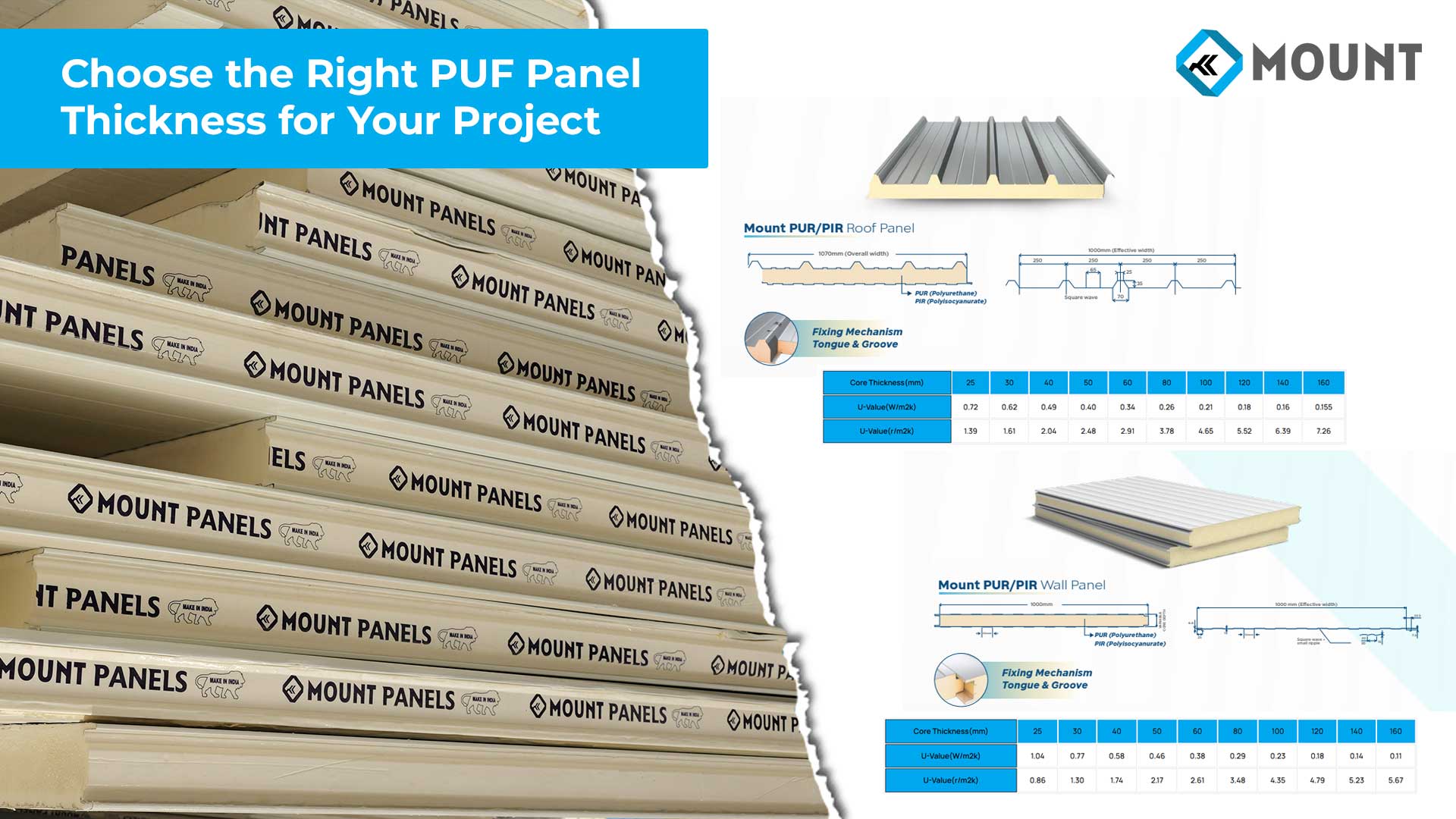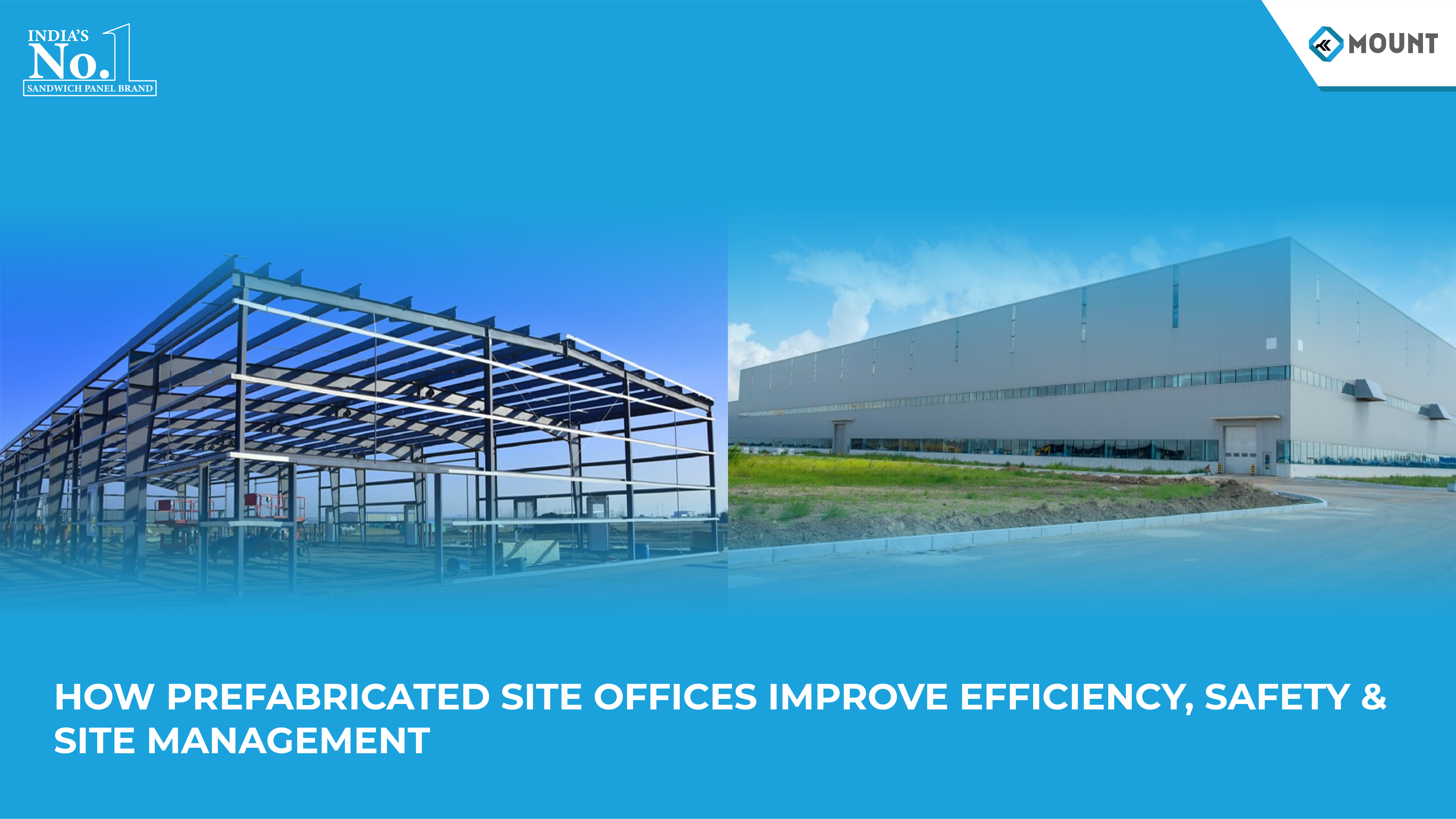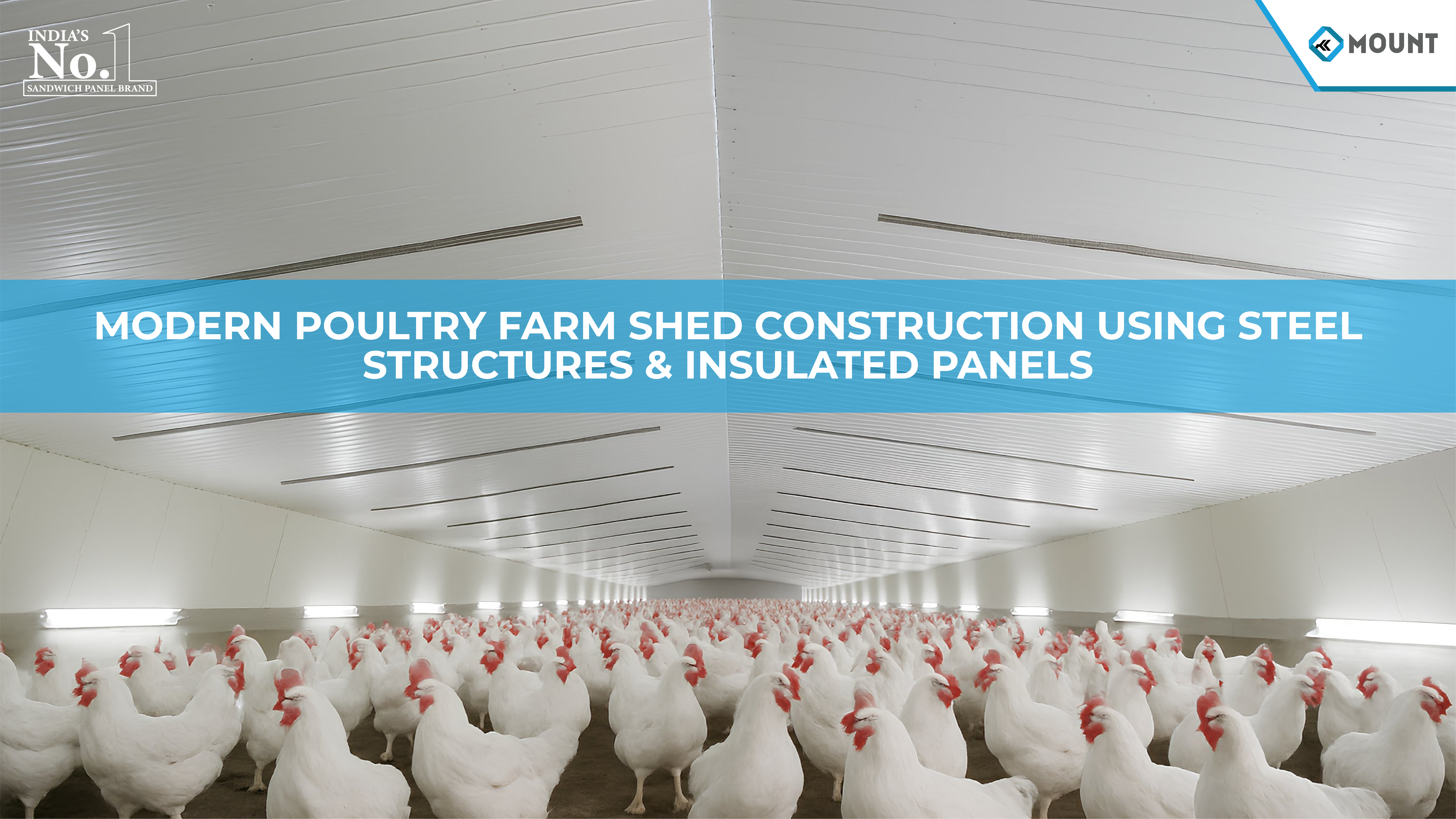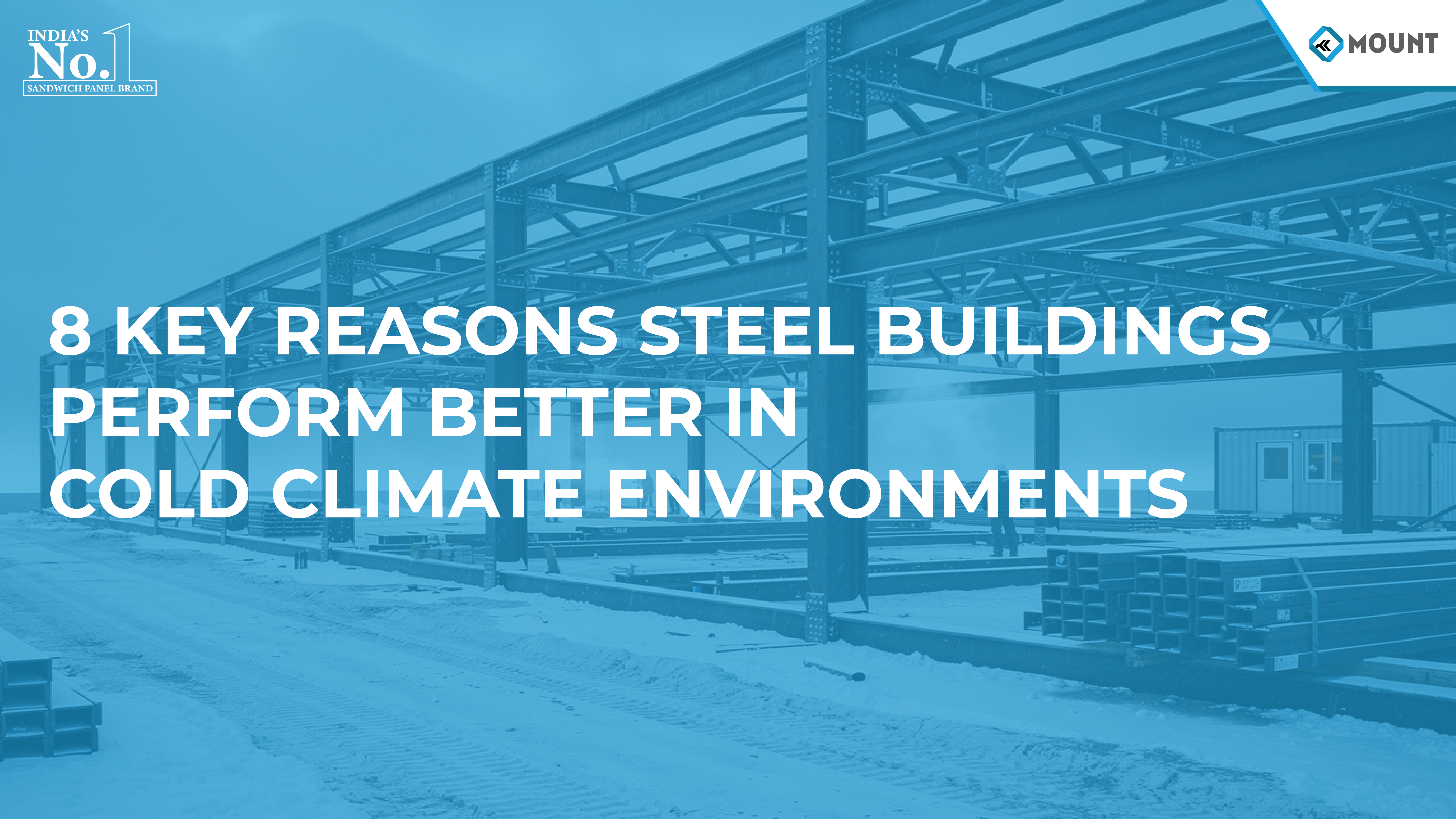
How to Choose the Right PUF Panel Thickness for Your Project
Choosing the right materials is among the most important decisions for any construction project. Polyurethane foam panels or PUF panels are one of the most common options for roofing and insulation today. They are appreciated for their excellent insulation properties and are sturdy enough to go with anything, from commercial warehouses to cold storage rooms.
Thickness is the key to making the project very efficient and cost-effective. From 30 to 50 mm, the thickness of the PUF panel is directly proportional to insulation performance, integrity of construction, and overall cost. We shall guide you to choose the right thickness appropriate to your needs.
Mount-roofing is among the leading manufacturers of insulated roofing sheets with years of experience in making quality PUF panels customised for varied projects. This article is about anything you want to know about PUF sandwich roofing sheets, including making the right decision based on your project’s specific needs.
Understanding PUF Panel Thickness: Why It Matters
The insulation capability of a PUF panel depends much more on the thickness of the panel. Typically, a PUF panel is made up of a polyurethane foam layer between two layers of metal, e.g., steel or aluminium. They insulate against heat or cold being transferred from inside to outside or vice versa.
30mm vs 50mm PUF Panels: Which Is Right for You?
Depending on your project needs, you could opt either for the 30mm or 50mm PUF panel. Here is how the thickness affects your project:
- 30mm PUF panels: These panels are considered for smaller projects or in those regions where most of the time is spent being mild. This gives them an intermediate cost barrier with insulation against heat and chill in the moderately temperate climate. 30mm cheaper panels find applications in light-duty roofing and wall cladding of industrial sheds or small warehouses to keep energy-efficient, unlike thicker panels.
Instance: For example, in the development of a small manufacturing unit or a low-rise commercial building in those lands with moderate temperatures, 30mm PUF panels can prove to be the most cost-effective option for the job. They provide just the right amount of insulation: not too much to end up costing, and not so little that it’s uncomfortable in that touch of temperature.
- 50mm PUF Panels: For larger structures or buildings located in warmer climates such as Hyderabad, Mangalore, Chennai, or Coimbatore, 50mm panels are an excellent choice, depending on their usage requirements. These panels offer superior insulation and hence necessitate strict temperature controls applicable to cold storage areas that could be warehouses or factories.-
Example: In such cold storage warehouses with stringent temperature requirements, 50mm thickness ensures minimum temperature fluctuation protection from spoilage to perishables.
Applications of PUF Panels in Different Industries
PUFs bring about many interesting possibilities for applications across various industries. Depending on what your project requires, you might want to explore some of these applications:
- Cold Storage
Thicker PUF panels are usually required in cold storage industries to preserve low temperatures. An insulated atmosphere is the prime condition for storage if the product includes food, pharmaceuticals, or other sensitive products that are prone to degradation or spoilage.
Example: For almost all cold storage setups and industries of Karnataka, MountRoof’s PUF sandwich panels are the preferred choice. With 50 mm panels, companies are able to conserve a lot of heat and energy, which, in turn, reduces the working cost.
- Warehouses and Industrial ShedsFor industrial sites, especially warehouses and commercial buildings, the right PUF panel thickness means durability and temperature control. Thirty-millimeter PUF panels suffice for structures with less demand for thermal insulation, while 50-millimeter panels offer a better performance rating for buildings with a more stringent requirement for protecting against external temperature changes.
- Roofing for Residential and Commercial PremisesIn residential and commercial premises, the finest application for PUF panels is for roofing and wall cladding. Depending on climatic conditions, time of structure, and insulation-type requirement, the builder should employ panels of varying thickness.
Choosing the Right Manufacturer for Your PUF Panels
Choosing the correct manufacturer is just as significant a decision as choosing the correct thickness. In working with any sandwich panel manufacturer or PUF roofing panel supplier, it is necessary that one works with a company that commands respect for the quality of materials and customer satisfaction. In Bangalore, Karnataka, and Chennai, Tamil Nadu. Where there is a great demand for insulated roofing sheet manufacturers, there are many to choose from.
Being a PUF sandwich roofing sheets manufacturer, Mount Roof has distinguished itself by delivering individualised high-performance solutions that suit each project’s specific needs. Be it the provision of standard PUF panels or specialised cold storage panels, Mount Roof promises the best quality materials that conform to standards.
Key Considerations When Choosing PUF Panel Thickness
The choice of thickness for your PUF panel is not only tied to insulation, and so, other elemental factors also interfere with the decision. Let’s have a close look at the major concerns:
- Environmental Conditions: Temperature and Humidity
One of the biggest factors, environmental conditions, for considering the thickness of your PUF panel is temperature. If your site is situated in a climate of extreme temperatures, such as Chennai or Mangalore, where there is a lot of humidity and intense heat, a thicker panel will perform better in stopping temperature fluctuations.
For instance, in the storage of cold applications, thicker panels-thicker PUF panels of 50mm, for example-maintain the internal temperature at a certain range to preserve the products. Example-The MountRoof projects in Bangalore have largely benefited from the use of 50mm PUF panels in large commercial buildings and warehouses. These 50mm PUF panels are fantastic at preventing heat from coming inside while keeping the internal environment cool, and this leads to the reduction of power bills and better temperature control. - Load-Bearing Capacity
The thickness of the PUF panel might affect the load-bearing capacity of the panel. The thicker the panel, the more resistant it is against heavy wind loads, snow loads, or other environmental occasions. For high-stress applications, 50 mm panels are preferred as it resists bending and deformation better.
Example: In Mangalore, which is prone to strong winds, MountRoof recommends 50 mm PUF panels for industrial sheds so that the integrity of the structure is maintained even under severe weather conditions. - Cost Considerations-While insulation-wise, 50 mm panels are superior to 30mm panels, they are more expensive. And this makes it imperative to weigh the insulation needs against the budget allotted for a project. If one cannot lose out on energy efficiency but cannot make an expensive investment either, 30 mm PUF panels could still work well.Example: Thirty-millimeter panels are a cheaper option that can give reasonable insulation to smaller warehouses or manufacturing units that do not need stringent thermal control.
Expert Insights: How MountRoof Ensures Optimal PUF Panel Solutions
Choosing the right PUF panel thickness is not always straightforward. Consult the experts, as they can help you tailor your solution! MountRoof will evaluate every single aspect of your project-from the load-bearing needs to energy efficiency goals-to recommend the ideal panel thickness.
Expert Quote: “In our experience, the 30mm PUF panels are great for industrial buildings that don’t need much insulation. However, cold storage has to have the thicker 50mm panels to keep the temperature stable,” says our Senior Engineer at MountRoof.
MountRoof’s expert team makes sure you get the best insulation possible and the cheapest solution to your environmental and structural needs.
Choosing the Right Supplier for Your PUF Panels
Partnering with a reliable supplier is vital for the procurement of high-quality sandwich panels. An experienced manufacturer having undergone various installations will be your best guarantee that the materials you pick conform to industry standards. In Mysore and nearby areas, MountRoof has established itself as a supplier of high-quality PUF sandwich roofing sheets and a provider of professional advice regarding the various thicknesses of panels that should be selected for different applications.
Why Choose MountRoof?
Expertise: Decades of experience in the PUF sandwich panel industry.
Customisation: Custom-made solutions for all jobs, from cold storage to commercial projects.
Quality Assurance: Materials that are high-performance in nature and can hold up to the test of time and energy conservation.
For durable quality and customer satisfaction, MountRoof has gained long-term customer relations. Be it in Hubli or in Chennai-Karnataka-country, our capable men are present to give you assistance towards choosing the finest solution for your job.
Common Queries
What is the difference between 30mm and 50mm PUF panels?
Answer: The prime difference between the two is in the aspect of insulation. Given comparatively less insulation, it is for moderate climates and light applications. On the other hand, 50mm panels give much better insulation, so they are used for high-temperature environments, such as cold storage.
Making the Right Choice for Your Project
It is indeed an essential choice of PUF panel thickness that decides the success of your construction or insulating project. Whether you are looking for 30mm PUF panels to cover costs on projects or 50mm PUF panels for cold storage type environments in harsh conditions, it is important to understand what exactly your project calls for. With manufacturers like MountRoof with years of experience, you will have the assurance of panels capable of excellent performance, durability, and energy efficiency.
MountRoof provides high-quality sandwich panels for every application, tailored to your needs. Be it a warehouse, cold storage, or commercial building, we will hold your hand through the entire process.
What are the differences between 30mm and 50mm PUF panels?
Answer: It is all about insulation. An intermediate level of insulation would be sufficient in 30 mm panels; hence, these are suitable for moderate climate applications. In 50 mm panels, however, insulation is better and is necessary for high-temperature areas such as cold storage.


